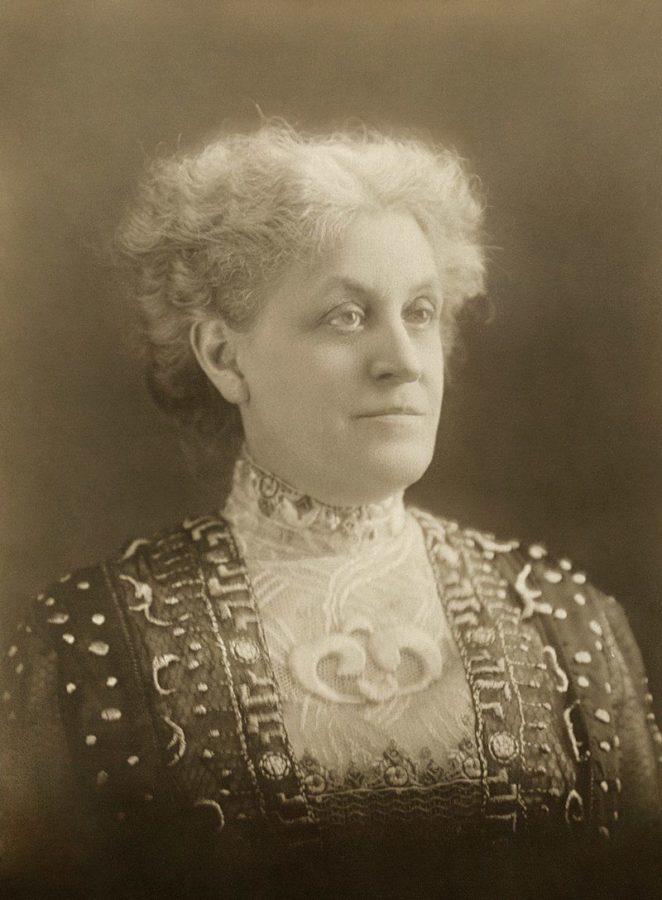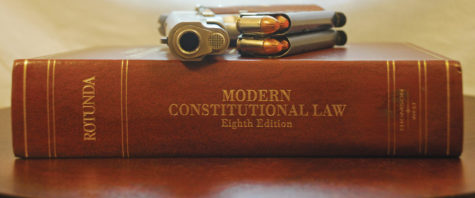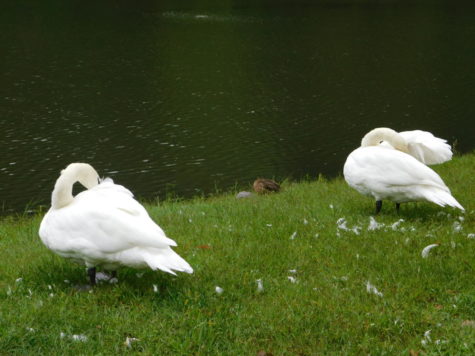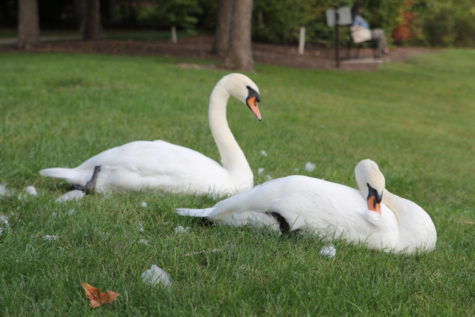Letter: Carrie Chapman Catt is not a racist
July 1, 2020
So, is this the Daily’s case against Carrie Chapman Catt: 1) a guest column that quotes a selected part of a chapter from a book (“I had approximately 48 hours to prepare this piece before publication”), 2) a charge by the editorial staff that Catt did not fight for all women’s suffrage and because the “battle to change Catt Hall’s name” has haunted our campus for “over a century” and 3) the fact that we should “take a moment to recognize Black activists?”
My charge to The Daily is work for justice and look at the facts, not emotions.
It is very amusing for me to read the public historian’s guest column and the editorial that says the battle to change the name has been going on for “over a century.” I was on campus and personally involved in almost all the events your public historian addresses, including serving on the committee (with Virginia Allen) formed by the university to study documents and report findings to GSB, the fundraising campaign and discussions at the time with those who attended the original meeting of the Sept. 29 Movement. I also have studied many of the over 10,000 documents at the Library of Congress and the New York Public Library on Catt; from this experience I have a short quiz for the writers and, just to be clear, I am not 135-years-old!
If Catt and the suffragists had only worked to get white women enfranchised, why is the 19th Amendment (still standing as the suffragists wrote it) worded the way it is? It followed the wording of the 15th Amendment granting suffrage to “citizens of the United States” and gave Congress the power of enforcement.
A U.S. senator on the floor of the Senate moved that the wording of the proposed amendment be changed to “white citizens.” Why was that change not made?
Catt additionally wrote in the same chapter, which your public historian quotes, that “all the people must be included” in the ballot; the chapter assumes Black women will be included. Catt also calls arguments against women’s suffrage in this chapter “ridiculous.” Can anyone quote the conclusion of the chapter?
W.E.B. Du Bois asked Catt to write for “The Crisis,” the magazine of the NAACP and she did. What did she say in her column?
If Catt was seen as racist by Black suffragists, why does Mary Church Terrell in her book “A Colored Woman in a White World” single out Catt as “without racial prejudice” and describe other suffragists, not by name, by saying the younger ones were more racist than the older ones? After all those years of knowing Catt was Terrell just easily deceived?
At the 1903 National Convention of National American Woman Suffrage Association (NAWSA) held in New Orleans and after a famous orator from Mississippi spoke on not enfranchising Black women or supporting the enfranchisement of Black men in 1870 and received great applause.
“We are all of us apt to be arrogant on the score of our Anglo-Saxon blood but we must remember that ages ago the ancestors of the Anglo-Saxons were regarded as so low and embruted that the Romans refused to have them for slaves,” Catt said. “The Anglo-Saxon is the dominant race today but things may change. The race that will be dominant through the ages will be the one that proves itself the most worthy.”
Do you agree speaking up when you are not supported by a crowd is difficult?
At a peace conference in Washington D.C. in 1921, Catt publicly called out hotels for segregating guests to the extent that while Black women would be allowed by the hotels to attend the conference, they would not be allowed to stay at the hotel or enter its dining room. Catt stated Black women should be in attendance and the reason so few were was due to the hotel policy in Washington D.C., which it refused to change. Before making this public statement, she had written the hotels trying to get them to change their policy, but received the response that it was “an unalterable rule that could not be violated.” Was she silly even to try?
From 1904 through 1923, Catt was president of the International Suffrage Alliance, traveling and establishing suffrage organizations in Africa, Europe, Asia and South America. Why is she respected in so many countries of the world, even today?
Most would say Eleanor Roosevelt was one of the best first ladies in history. Carrie Chapman Catt mentored Eleanor Roosevelt; they spoke together to large audiences and Eleanor Roosevelt dedicated one of her books to Catt.
Do you believe Eleanor Roosevelt was delusional? Support your answer.
So, here is what is concerning as well as amusing: very, very few people who speak on this issue know anything about Carrie Chapman Catt other than a few quotes they have been given to read.
Why are the writers of these three pieces unwilling to do the research from primary sources required to make a fair assessment of Catt? Why are members of the Sept. 29th Movement believed but no one else? I talked to two people who attended their first meeting and was told the initial goal by the Movement was to raise money to refurbish the Black Student Center on Welch Avenue.
Many possibilities were explored and they felt their best option was to attack the newly named Catt Hall. The group appointed a student historian to do “research” on Catt and, thus, they began. I was told personally these two never returned for another meeting because they thought this method of getting university money was “too dishonest.”
This is a research university, let’s have significant research presented by those who have actually done the homework required, not those who are fed certain information and do not make the effort to ascertain if it is just.
Carrie Chapman Catt, although she could already vote in the state of New York where she lived, continued working for a federal amendment to enfranchise all women citizens.
To win an amendment to the Constitution, you must get a three-fourths majority vote in the House, a three-fourths majority vote in the Senate and then ratification by two-thirds of the state legislatures (at that time 36 states).
The proposed amendment was brief and to the point. It said: “The right of citizens of the United States to vote shall not be denied or abridged by the United States or any state on account of sex. Congress shall have power to enforce this article by appropriate legislation.”
Suffragists, including Catt, had spoken before committees in the House and Senate since 1878. It had never gotten out of committee, and if it ever would, it was known from the start most Southern congressmen and most Southern legislatures would vote against it since Black women would then be enfranchised.
Here are a few quotes from Southern U.S. senators when the proposed amendment finally reached debate on the floor of Congress:
“The illiterate colored woman, for instance, irrespective of her nonconception of the duties of citizenship, may vote and pair with the most intelligent woman of the Caucasian race,” a senator from North Carolina said. “Congress reserves the right of appropriate legislation to enforce this mandate, regardless of the state. This is the condition in a nutshell. I wonder if woman suffrage advocates in the South have taken into consideration all the embarrassing features possible under such legislation.”
“We opponents of the amendment are trying to save the women of Georgia from a repetition of reconstruction days,” a Georgian senator said. “It is not a question of woman suffrage but of protecting Georgia womanhood.”
A Mississippi senator said he “favored a white woman’s primary in which the women of the state might say whether they wanted the ballot or not.”
“Women should not be allowed to vote,” another senator said. “Their privilege and obligation is to bear children […] the sole intent of this voting privilege is to equalize white women with Negro women […] these suffragists, men and women, are out with a propaganda for race suicide.”
“I would rather die and go to hell than vote for woman suffrage,” Rep. R.H. Watts of Rankin County, Mississippi, said.
The press reported, “The boys cheered nearly a minute.”
These are some responses from the men who would actually be voting on this issue, the women suffragists could only try to influence and hope.
In late 1917, Catt and others wrote a short book about various topics concerning the possible passage of a women suffrage constitutional amendment. Catt wrote some of the chapters, including chapter six, which concerns some of the objections to the amendment (of which there were many) and possible ways to answer those objections for the more than million women and men who were members of NAWSA.
She writes about the arguments that would support states’ rights and how to respond to them, how to respond to Southern members of Congress who oppose the amendment because it would confer the vote upon Black women and would interfere with white supremacy, what to say to those who believe women don’t want to vote and shouldn’t be pressured to do so, how to answer politicians who say their constituency is against suffrage and others.
In the section directed toward the Southern members of Congress, she begins by writing it is difficult to believe this objection of sincerity since facts do not support it and then gives the statistics.
“The facts are that woman suffrage secured by Federal Amendment would be subject to whatever restrictions may be imposed by state constitutions (provided those restrictions are in accord with the National Constitution),” Catt said.
She had said in other speeches such restrictions, such as the grandfather clause, were “unconstitutional,” and then writes, “If the South really wants white supremacy, it will urge the enfranchisement of women.” In other words, vote for this constitutional amendment and your world will not change. She does NOT say, “I support white supremacy and the grandfather clause.” She is turning the argument of the Southern congressmen back on them in trying to win support for the amendment that will enfranchise all women citizens.
I understand Dr. Barron views this differently, but I am not alone in my interpretation. Scholars of rhetoric, historians and academicians with as many degrees as Dr. Barron and with even more experience have seen these few short pages in a different way.
I urge you to read the entire chapter where she supports giving the right to vote to everyone, after running through a few fears of the population:
“The South professes to fear the increased Negro vote; the North, the increased Foreign vote; the rich, the increased labor vote; the conservative, the increased illiterate vote. The Republicans since the recent presidential election fear the increased Democratic vote; the Democrats fear the woman voters’ support was only temporary. Certain very numerous elements fear the increased Catholic vote and still others the increased Jewish vote. The Orthodox Protestant and Catholic fear the increased free-thinking vote and the free-thinkers are decidedly afraid of the increased church vote… The answer to one is the answer to all… Obviously all the people must be included.”
To those who agree with Dr. Barron that Catt is a “white supremacist,” I would respond by asking them to go beyond this chapter. The Catt Center has almost one hundred speeches she has made; the Library of Congress has placed online thousands of her letters, speeches and articles. Search them for those two words and let me know how many times you find them. That’s your assignment from a long-time teacher.
Read and explore!
Jane Cox is an alumna and professor emerita from Iowa State University.
















